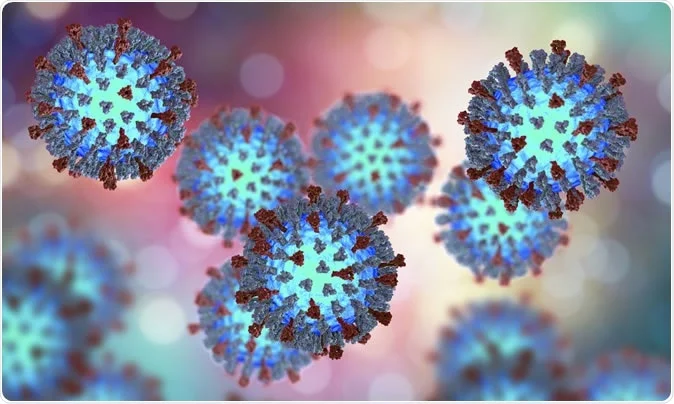
Mealses
Overview
Measles (also called rubeloa) is caused by the highly contagious measles virus. Two doses of the MMR (measles, mumps, and rubella) vaccine offer long-lasting protection against measles. Measles can cause serious health consequences that can be long-lasting and show up years after the disease has gone away.
Reguarding outbreaks and cases:
CDC offers an outbreak and cases page that is updated every Friday. Please refer to this page for information in your area.
Spread (transmission)
Measles is highly contagious and spreads through the air. If you aren’t immune to the virus, you can get measles just by being in the same room someone with measles has been in—even two hours later. The virus is so contagious that if one person has it, 9 out of 10 people nearby who are not immune will become infected.
Symptoms
Seven to 14 days after contracting the virus, a person will come down with a high fever, cough, runny nose, and red, watery eyes. After these symptoms appear, 2–3 days later, Kopilk spots may appear in the mouth. These are small white spots that appear on the inside of the mouth.
The measles rash comes around 3–5 days after the initial symptoms appear and may bring a high fever (104° F). This rash begins as flat red spots on the face and hairline, which spread down the neck, trunk, arms, legs, and feet. The spots may join together as they spread. The flat red spots may gain small raised bumps atop them.
Treatment
Symptoms of measles can be treated, but there is no cure or specific treatment for the virus.
Complications
Common complications:
- Ear infection (1 out of 10 child cases)
- Diarrhea (less than 1 out of 10 cases)
Severe complications:
- Hospitalization (1 in 5 unvaccinated cases)
- Pneumonia (1 in 20 children) – Most common cause of death from measles in young children
- Encephalitis (swelling of brain) – can lead to convulsions and leave the child deaf or with intellectual disability (1 in 1,000 cases)
- Death (1 to 3 of every 1,000 children who become infected with measles will die from respiratory and neurologic complications)
- Complications during pregnancy – may cause birth prematurely or have a low-birth-weight baby
Long-term complications:
- Subacute sclerosing panencephalitis (SSPE) is a very rare but fatal disease of the central nervous system. People who get SSPE from a measles virus infection acquired it earlier in life.
Who is at risk
Measles can be serious for anyone, but these groups are more likely to suffer severe complications:
- Children under 5
- Adults older than 20
- Pregnant patients
- People with weak immune systems
Vaccine
There are two vaccines that offer protection against measles: MMR (measles, mumps, and rubella) and MMRV (also contains varicalla [chickenpox]). One dose of the vaccine is 93% effective against measles, and two doses are 97% effective against measles.
Children are recommended to recieve two doses of MMR or MMRV. These doses are given at 11–15 months old and 4–6 years old. Please refer to CDC’s measles vaccination page for dosing beyond the recommended childhood schedule.
Possible side effects are listed here.
Strange things
Measles can make the body forget how to fight infections. Having the measles can cause “immune amnesia,” making survivors potentially susceptible to other diseases they’ve already had or been vaccinated against. This can last several years.
Current situation: Outbreaks and cases
CDC offers an outbreak and cases page that is updated every Friday. Please refer to this page for information in your area.
Resources
- CDC: Measles (Rubeloa) page with links to many resources
- American Society for Microbiology: Measles and Immune Amnesia
- CDC: Measles Vaccine Recommendations
- CDC: Measles Cases and Outbreaks
- CDC: Clinical Overview of Measles
- CDC Vaccine VIS pages: MMR and MMRV
- Immunize.org: Measles Images
